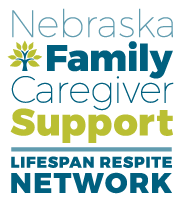![]()

Caregiving is a tough job. During November, caregivers of every kind are recognized, whether it be taking a relative to a doctor’s office, managing medications, or the overall care of a loved one.
Nationally, over 60% of caregivers work outside of the home. In 2022, over 59% of working caregivers surveyed in Nebraska are the primary caregiver of a loved one. Some caregivers may feel overwhelmed at times because of their “double duty”. According to the most recent publication of the “Caregiving in the U.S. 2020 Executive Summary” from the AARP, one in four caregivers find it difficult to take care of their health. A similar number reported caregiving has worsened their health due to the stress of providing ongoing care. Because of this, caregivers are encouraged to take some time off from their job for a period of time when possible. Employees covered under the federal Family and Medical Leave Act may be able to take up to 12 weeks of unpaid leave a year to care for relatives.
Caregivers of adults typically provide care for 4-5 years on average with an increasing proportion reporting they have been providing care for five years or longer. Caregivers leave their jobs for different reasons, but most often it is because of the stress of caring for a loved one.
The signs of caregiver stress can be:
- Feeling overwhelmed or constantly worried, often feeling tired, or feeling sad
- Getting too much or not enough sleep, or gaining or losing weight
- Becoming easily irritated or angry and having a lack of interest in activities that used to be fun
- Having frequent headaches, bodily pain, or other physical problems
- Abusing alcohol or drugs, including prescription medications
Because of the stress, caregivers need a chance to recharge and obtain emotional support, recognition, and understanding from others of the role they play within the family. If they are paid by family, any wage should be commensurate with the care provided as much as possible.
Home care is the preferred method of health care delivery among the disabled, elderly, and chronically ill, with 90% of Americans wanting to age in place with home care. Home care provides high-quality, compassionate care to more than 5 million Americans annually. In Nebraska, the majority of working caregivers surveyed were caring for a parent or parent-in-law. The most prevalent conditions requiring care are long-term health conditions and other care needs such as aging, frailty, and mobility issues. Thirty-seven percent of respondents reported caring for a parent or parent-in-law and twenty-five percent reported caring for a child.
Most communities have some type of respite care available, such as in-home respite where aides come into the home for a period of time; adult care centers/programs and short-term respite care is available as well in some assisted living communities. It is not unusual for caregivers to have a hard time asking for help. Rather than struggling, take advantage of local resources for caregivers by checking out the Eldercare Locator or contacting the local Area Agency on Aging (AAA) to learn about services within the community. Find the local AAA online or in the government section of the telephone directory. Also, refer to the Nebraska Resource and Referral System that provides local services and providers which can specifically generate a list based on the area the recipient resides and the service type needed.
National Caregiver Month aims to raise awareness and ease caregivers’ burdens. Some tools such as apps for seniors can be downloaded onto a smartphone, while other tools transform an entire house into a secure network to help protect seniors or others from danger. Easing the burden for caregivers will improve the overall quality of care while allowing them much-needed respite from what normally requires full attention.
For more information, visit www.respite.ne.gov to find additional resources, or contact your local respite coordinator by calling 1-866-RESPITE.
